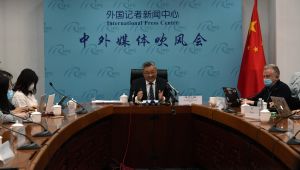The chilling news of North Korea's artillery attack on South Korea's Yeonpyeong Island is a serious escalation of an already tense situation on the Korean Peninsula and a major challenge to regional stability. It comes on the heels of the latest revelation about North Korea's nuclear program: that the Communist regime had secretly built a stunningly modern nuclear facility to enrich uranium. That news alone would likely have been enough to increase diplomatic pressure on China-the only world power with real leverage over Pyongyang-to rein in its sociopathic neighbor.
White House and other senior administration officials have stressed that the new facility violates several agreements that North Korea has signed with the United States, other participants in the so-called six-party talks, and the United Nations. The new facility does not constitute a "crisis," according to Stephen Bosworth, the U.S. envoy to North Korea, after a meeting Monday with South Korea's foreign minister. But there is little doubt that North Korea's decision to show off its new facility and its 2,000 centrifuges to Siegfried Hecker, a Stanford physicist and former head of the Los Alamos National Laboratory, highlights the danger that North Korea poses to regional stability and to efforts to stop the spread of nuclear-weapons technology and materials.
Despite repeated efforts, neither Republican nor Democratic administrations have had much luck stopping North Korea from pursuing nuclear weapons or from selling its deadly expertise and materials to nuclear wannabes. Israeli and American officials say that North Korea supplied a nearly completed nuclear reactor to Syria, which Israel destroyed in an air attack in the fall of 2007. And in 2004, American officials reportedly found a shipment of uranium hexafluoride, most likely from North Korea, in nuclear materials recovered from Libya after Muammar el-Qaddafi shut down his WMD programs.
The Yongbyon revelations have prompted intense debate within policy circles about North Korea's capabilities and intentions-for instance, about whether North Korea was able to build the new enrichment facility without foreign help and about what it intends to do with this plant and more broadly, with its nuclear program. Some hope that Pyongyang wants to use the facility as a bargaining chip and that it may scale back its program to get sanctions lifted and secure normal relations with the U.S. and other nations. But more officials take the pessimistic view that Pyongyang unveiled the new facility to persuade Washington and its allies to accept North Korea as a member of the nuclear-weapons club.
There is a pessimistic consensus on several other troubling issues. Since American and international inspectors were visiting Yongbyon as recently as 2009, officials have concluded that North Korea probably first built an enrichment facility elsewhere-and moved its already-tested technology to Yongbyon only recently. Many experts also believe that North Korea probably has other covert nuclear facilities-perhaps another enrichment facility, centrifuge manufacturing and testing facilities, and a research and development lab that it also has not disclosed.
Finally, there is an unhappy consensus that Washington has little direct political or economic leverage on North Korea. The use of military force against North Korea, for instance, is not seen as a viable option, since South Korea is held hostage by 10,000 artillery pieces within range of Seoul-as today's attack demonstrated. All of this means that the burden of constraining North Korea's nuclear program falls on China, North Korea's single largest trading partner and most generous aid donor.
North Korea is not a viable state without Chinese support. Beijing has leverage to thwart Pyongyang's nuclear program, but to date it has refused to do so, fearing political instability and refugee flows. Marcus Noland, an economist at the Peterson Institute for International Economics, notes that China has been unwilling even to implement existing sanctions against North Korea. Under UN sanctions, for example, member states are not supposed to send luxury goods to North Korea; but not only has Beijing never formally submitted or publicly released a list of luxury goods it will refuse to send, he says, its exports to North Korea of items that appear on other countries' luxury-goods lists have increased since 2007. Moreover, he notes, for months China prevented the committee of experts charged with implementing UN sanctions from reporting to the Security Council. If anything, the planned dynastic succession in North Korea-in which Kim Jong-il would pass power over to his son, Kim Jong-un-has made China even more reluctant to pressure North Korea over its nuclear activities.
The United States could help China take the hard steps needed to halt and reverse North Korea's nuclear-weapons programs. First, we should insist that there be no more nuclear blackmail payments made to Pyongyang. Second, we must persuade China that North Korea's actions are antithetical to its security interests because they increase the need for American forces in the region, push South Korea and Japan closer to Washington, and encourage them to expand their current missile-defense systems. China holds a powerful sword over North Korea's head: it can withdraw its apparent approval of the regime's dynastic succession plan.
Bosworth is scheduled to meet today with his Chinese counterparts to discuss the latest nuclear developments in North Korea-and now, surely, the outbreak of artillery fire as well. Let us hope that he has greater success persuading Beijing to flex its muscle with Pyongyang than the U.S. has had in scaling back North Korea's nuclear activities.
Tobey, William. “Peninsula of Fear.” City Journal, November 23, 2010



